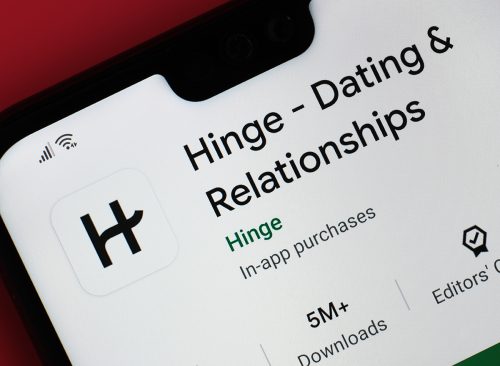Woman Scammed Out of $450K in Online Romance Scam Called “Pig Butchering”
37-year-old Philadelphia woman scammed out of hundreds of thousands.

Shreya Datta thought she met her dream man on the dating app Hinge. “I was in a trance,” she told the Philadelphia Inquirer. “I felt like I had met my person.” The 37-year-old tech executive thought there could be a future with Ancel Mali, who said he was a wine trader from France and moved to West Philadelphia, but in reality, was a victim of a popular scam known as “pig-butchering” and lost $450,000. Read on to learn more about it.

Scammers pretend they are looking for a committed long-term partner. Once they find an unsuspecting victim, they build a relationship and convince the person to invest in a fake app where in the beginning it looks like they are earning money. The person can even withdraw funds a few times, but then the victim is asking to pay a tax before they can withdraw any more money, which is the last attempt to get more money out of someone before they realize it’s a scam.

Datta was divorced and looking for love, so she was on dating apps hoping to find “the one.” When she first met Mali on Hinge, the two moved their conversations to WhatsApp and he quickly deleted the app. She told the Inquirer that she liked that Mali wanted to focus on her and not talk to other women while getting to know her. During the first week of their conservations, Mali talked about wanting financial freedom. “So that I don’t have to work all my life, and I can have more time to accompany my lover to travel around the world, leaving footprints of our love in every corner of the world,” he wrote in messages obtained by the Inquirer.

In 2008, Datta moved to the States from India for her master’s degree and planned to meet Mali after she returned from a family visit to Pune. During that time, he encouraged her to try crypto trading, and gave her tips on how to invest. He texted, “You can use the money you earn to treat me to dinner,” the Inquirer reports. Meanwhile, Mali supposedly went to California to see his uncle with terminal cancer. The two did video chat twice, but very quickly and Mali didn’t show his face saying he was shy, but showed his dog instead, according to the Inquirer.

The two had yet to meet in person, but at the suggestion of Mali, Datta downloaded what she thought was a SoFi’s crypto trading app through a link he sent her. She believed it was legit because it had two-factor authentication and customer service, which she would come to regularly communicate with. She sent $1,000 from her savings to the app and within minutes watched it turn into $1,250. At this point she was able to withdraw the entire balance.

Weeks later, Mali still wasn’t able to have a face to face meeting with Datta because he had a business trip in San Francisco, the Inquirer reports. She now had turned $6,000 into $9,000 and the two continued staying in contact on a regular basis. They’d sent flirty messages, talked about vegan meals she cooked and how she volunteered at an animal shelter. When she thanked him for helping her invest he replied, “I said I would protect you” and it was just how Datta dreamed of being taken care of.

Datta was getting swept away with the attention she was getting from Mali who would check in on her regularly and even sent flowers on Valentine’s Day. But he started insisting she invest large sums of money. According to the Inquirer he lent her $150,000 and urged her to invest more of her money. She sold stocks and took out personal loans, but grew angry when she had a tough time tapping into her 401(k) account, facing questions at work about why she wanted to do so. “Can’t you control your own money?” he said. “Please talk to me nicely,” she wrote back. After a few months of correspondence with Mali, Datta’s $450,000 investment in the fake app had more than doubled. She only knew she was scammed when she tried to withdraw money and received a message that she had to first pay a 10% personal tax.

Realizing she’d been caught up in a scheme, Datta reached out to her brother, who was an attorney in London, and hired a private investigator. They uncovered the photos of Mali were actually of a German fitness influencer, and suddenly all the excuses of not being able to meet up made sense to Datta.

Reeling with shame over the situation, Datta focused on what she still had: family to help her get out of debt and a high-paying job. Sometimes I’m like, ‘It’s just money,’” she told the Inquirer. “Some days I’m like, ‘I should just cry.’” She joined a support group for victims of cyber romance scams and shares what made her the perfect victim. “I felt like I had a hole in my soul from not having a man in my life.” She also explained that investing with Mali made her feel that she was “taking empowered action.” She added that she doesn’t want others to experience what she did and is sharing her story. “My goal is to not hide,” she said.

The Department of Justice has seized over $112 million in funds that have been linked to cryptocurrency investment schemes, according to the U.S. Attorney’s Office, Central District of California. “Seizure warrants for six virtual currency accounts were authorized by judges in Los Angeles, the District of Arizona, and the District of Idaho. In the Los Angeles matter, a United States magistrate judge authorized the seizure of an account containing approximately $66.4 million in various cryptocurrencies after finding probable cause that the funds were derived from wire fraud schemes.”

According to the USAO, “The victims in Pig Butchering schemes are referred to as ‘pigs’ by the scammers because the scammers will use elaborate storylines to ‘fatten up’ victims into believing they are in a romantic or otherwise close personal relationship,” according to the affidavit in support of the Los Angeles seizure warrant. “Once the victim places enough trust in the scammer, the scammer brings the victim into a cryptocurrency investment scheme.”

The scammers use different methods to reach out to people.The USAO states, “According to the FBI, the highest number of reports came from victims between the ages of 30 and 49. In these schemes, often called “Sha Zhu Pan,” a Chinese phrase that loosely translates to “pig butchering,” scammers often target their victims through social networking and online communications platforms, dating websites, and phone calls and text messages that are meant to appear to have been misdialed.”

Vice News and South China Morning Post have done extensive reporting on pig-butchering and uncovered many scams that run out of centers in Cambodia and staffed with thousands of people are lured to another country by the promise of a legitimate job. The workers are given scripts tailored to different kinds of victims and are often abused.














